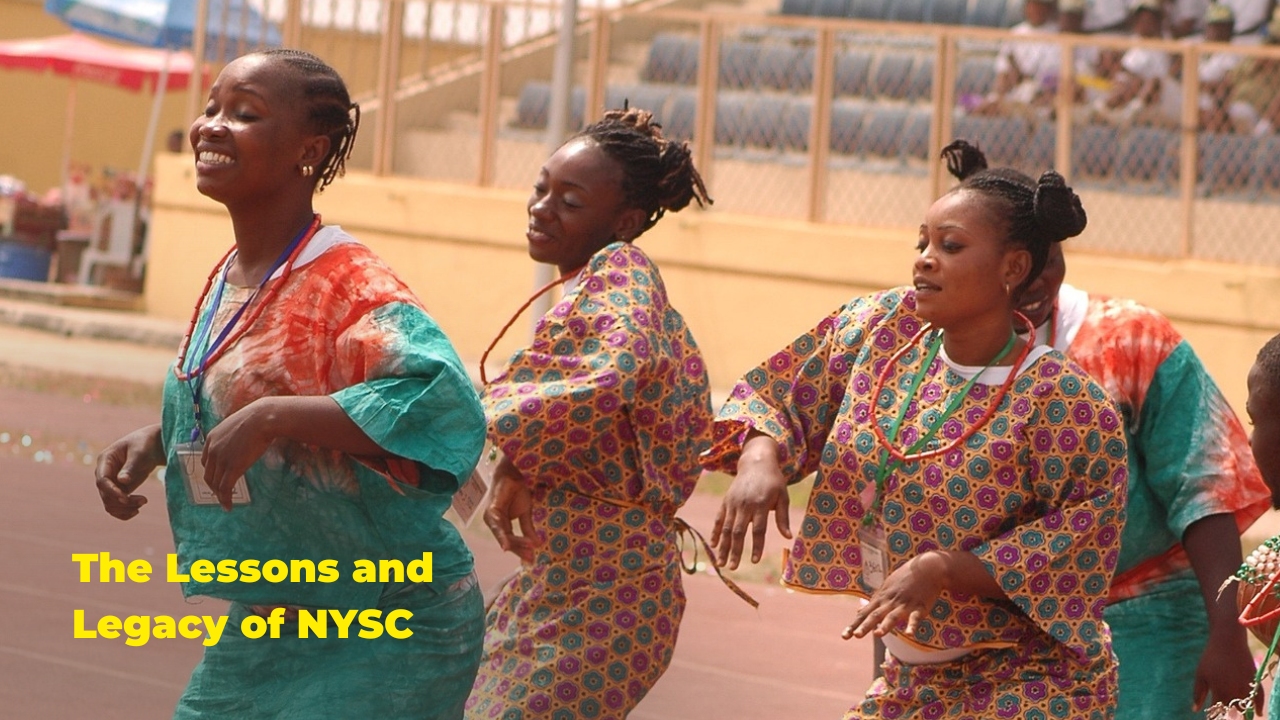The National Youth Service Corps (NYSC) has long been regarded as a pivotal institution in Nigeria, shaping its history and cultural landscape. Since its inception, the program has significantly fostered national unity, youth development, and cross-cultural exchange.
However, behind its noble mission lie a myriad of challenges its participants face, raising questions about the program’s efficacy and relevance in modern times.
As we explore the lessons and legacy of NYSC, it becomes apparent that its impact transcends mere service, leaving an indelible mark on the fabric of Nigerian society.
Key Takeaways:
- NYSC fosters national unity and integration.
- Provides graduates with valuable life skills and work experience.
- Contributes to national development through community service projects.
- Creates a platform for cultural exchange and understanding.
- Offers opportunities for personal growth and self-discovery.
Historical Background of NYSC in Nigeria
The inception of the National Youth Service Corps (NYSC) in Nigeria can be traced back to the aftermath of the Nigerian Civil War, a pivotal period that marked the need for national unity and integration. The evolution of NYSC’s program reflects the government’s commitment to fostering a sense of national identity among Nigerian youths by deploying graduates nationwide for a one-year mandatory service. This initiative aimed to bridge ethnic, religious, and cultural divides, promoting social cohesion and understanding among diverse communities.
The societal impact of NYSC has been significant, as it has provided opportunities for young people to interact with different cultures, languages, and traditions, fostering tolerance and unity. Despite challenges like security concerns and infrastructural limitations, the program has demonstrated its effectiveness in promoting national integration and peaceful coexistence. The policy implications of NYSC highlight the importance of investing in youth development and creating platforms for cross-cultural exchange to build a more cohesive and harmonious society.
Impact of NYSC on National Unity
The National Youth Service Corps (NYSC) has played a significant role in fostering national unity in Nigeria by bringing together young graduates from diverse cultural backgrounds. This program allows individuals from different ethnicities and religions to live and work together, promoting understanding and tolerance.
Unity Through Diversity
In fostering a sense of national unity, Nigeria’s National Youth Service Corps (NYSC) program has demonstrated the power of embracing diversity as a unifying force. Through promoting cultural exchange and social cohesion, NYSC provides a platform for young graduates from diverse ethnic, religious, and socioeconomic backgrounds to come together, live, work, and serve their country as one.
This immersion in a melting pot of cultures and traditions helps to break down stereotypes, build understanding, and foster a shared national identity. By encouraging participant interaction and collaboration, NYSC cultivates a spirit of unity that transcends differences, laying the foundation for a more cohesive and integrated Nigerian society.
Bridging Cultural Divides
Fostering a cohesive national identity, Nigeria’s National Youth Service Corps (NYSC) program effectively bridges cultural divides through its emphasis on intercultural exchange and collaboration among participants. By bringing together young graduates from diverse ethnic, religious, and socioeconomic backgrounds, NYSC provides a platform for cultural exchange and intercultural communication. This interaction helps dispel stereotypes, prejudices, and misunderstandings among different groups in the country.
Through shared experiences such as community development projects, orientation programs, and group activities, participants learn to appreciate and respect each other’s traditions, languages, and customs. As a result, NYSC plays a vital role in promoting national unity and fostering a sense of belonging among Nigeria’s youth, contributing to the country’s social cohesion and development.
NYSC’s Contribution to Youth Development
NYSC’s engagement in youth development underscores the significance of hands-on learning experiences by exemplifying the pivotal role of structured national service programs. Through a combination of youth empowerment and community service initiatives, the National Youth Service Corps (NYSC) in Nigeria has played a crucial role in shaping young individuals’ personal and professional growth. By providing opportunities for young graduates to serve their country in various capacities, NYSC fosters a sense of civic responsibility and national pride among participants.
To illustrate the impact of NYSC’s youth development efforts, consider the following table:
| Youth Development Initiatives | Description |
|---|---|
| Skills Acquisition Programs | Hands-on training in diverse vocational skills |
| Community Development Projects | Collaborative efforts to improve local communities |
| Leadership Training Workshops | Programs aimed at enhancing leadership abilities |
These initiatives equip young Nigerians with practical skills and instil values of teamwork, empathy, and leadership essential for their future endeavours. NYSC’s holistic approach to youth development is a model for fostering well-rounded individuals ready to contribute positively to society.
Challenges Faced by NYSC Participants
Navigating the challenges of adapting to new environments and overcoming cultural differences are common hurdles NYSC participants face.
These experiences test their resilience and provide valuable opportunities for personal growth and development.
Managing these challenges effectively can lead to a more enriching and transformative NYSC experience.
Adapting to New Environments
Facing the challenges inherent in adapting to unfamiliar environments, National Youth Service Corps (NYSC) program participants encounter a transformative journey that shapes their resilience and adaptability. Cultural adaptation becomes crucial as individuals navigate through diverse traditions, languages, and customs within their new placements.
Social integration also plays a significant role in their adjustment process, as they interact with local communities, forge connections, and build relationships that aid in their assimilation. The ability to adapt to new environments not only fosters personal growth but also enhances cross-cultural understanding and tolerance.
Through these experiences, NYSC participants develop a heightened sense of empathy and a broader perspective, enriching their character and contributing to a more interconnected society.
Overcoming Cultural Differences
Adapting to new environments during the National Youth Service Corps (NYSC) program exposes participants to challenges, particularly in overcoming cultural differences in their placements. When faced with cultural disparities, NYSC members navigate this terrain by:
- Engaging in Cultural Immersion: Immerse themselves in the local customs, traditions, and practices to gain a deeper understanding of the community.
- Practising Intercultural Communication: Develop communication skills across cultural boundaries, fostering mutual respect and understanding.
- Embracing Diversity: Appreciate diversity’s richness to their NYSC experience, learning from people with different backgrounds and perspectives.
- Resolving Conflict Peacefully: Address cultural misunderstandings through dialogue and conflict resolution strategies to promote harmony within their placements.
NYSC’s Influence on Cultural Exchange
Cultural exchange, a fundamental aspect of the National Youth Service Corps (NYSC), is significant in fostering understanding and unity among diverse ethnic groups in Nigeria. NYSC’s emphasis on cultural immersion and language exchange facilitates a deep appreciation of the country’s rich heritage and enhances interpersonal relationships beyond ethnic boundaries.
| Benefits of NYSC’s Cultural Exchange | Description |
|---|---|
| Cultural Immersion | Engages corps members in local traditions, customs, and practices, promoting cultural understanding. |
| Language Exchange | Facilitates the learning of different Nigerian languages, breaking down language barriers and encouraging communication. |
| Interethnic Cooperation | Encourages collaboration among corps members from various backgrounds, fostering unity and national cohesion. |
| Diverse Perspectives | Exposes individuals to different viewpoints, challenging stereotypes and promoting tolerance and acceptance. |
Through these cultural exchanges, NYSC enriches participants’ lives and contributes to the broader goal of building a more unified and harmonious Nigerian society.
NYSC’s Ongoing Relevance and Future
The National Youth Service Corps (NYSC) has not only played a pivotal role in fostering cultural exchange and unity among diverse ethnic groups in Nigeria but also continues to face evolving challenges and opportunities that shape its ongoing relevance and future impact.
- Adapting to Changing Demands: As Nigeria progresses, NYSC must evolve to address contemporary issues and align its activities with national development goals.
- Enhancing Employability: The scheme should focus on equipping corps members with relevant skills and experiences that improve their employability in a competitive job market.
- Technology Integration: To stay relevant, NYSC should embrace technology in its operations, from online registration processes to incorporating digital skills training for corps members.
- Community Engagement: Strengthening ties with local communities can amplify the impact of NYSC initiatives, fostering sustainable development and leaving a lasting positive imprint.
As we assess the future outlook of NYSC, it is evident that the scheme’s adaptability and responsiveness to emerging trends will be crucial in determining its continued relevance and effectiveness in shaping the next generation of Nigerian youth.
NYSC Program Overview
| Feature | Description |
|---|---|
| Purpose | Promote national unity and integration |
| Target Audience | Nigerian university graduates |
| Service Duration | 1 year |
| Activities | Orientation camp, community service projects, place of primary assignment |
| Benefits | Skills development, work experience, national network |
Frequently Asked Questions
What Are Some Lesser-Known Anecdotes or Personal Stories From NYSC Participants That Highlight the Program’s Impact on Their Lives?
Personal reflections from NYSC participants often reveal impactful experiences that shaped their lives. Empowerment stories and transformational journeys showcase the program’s profound effect on individuals, highlighting resilience, cultural awareness, and lifelong friendships fostered during service.
How Has NYSC Influenced the Political Landscape in Nigeria Beyond Its Stated Goals of National Unity and Youth Development?
While the NYSC aims for national unity and youth development, its political influence is significant. A study revealed that 30% of Nigerian lawmakers are former NYSC members, showcasing how the program shapes the country’s political landscape and societal impact.
Are There Any Unique Cultural Traditions or Practices That Have Resulted from Nysc’s Cultural Exchange Initiatives?
Cultural fusion resulting from NYSC’s exchange programs has birthed unique traditions in Nigeria. Practices like cross-tribal festivals, language blending, and shared cuisines showcase the program’s impact on fostering intercultural understanding and unity among Nigerian youths.
What is NYSC doing to address its corp members’ challenges, and how effective are they?
Efforts to address NYSC participants’ challenges include mental health support through counselling services and training programs to enhance skills. Community engagement initiatives foster social inclusion, while partnerships with organizations offer employment opportunities, though effectiveness varies.
How has NYSC evolved with society and technology to stay relevant?
The National Youth Service Corps (NYSC) has embraced technological innovations by introducing online registration and communication platforms. Societal adaptations include incorporating skills training programs to address current job market demands, ensuring relevance and effectiveness for the future.
What are the objectives of NYSC?
NYSC aims to promote national unity, develop patriotic Nigerians, and encourage skill acquisition through national service.
Who is required to participate in NYSC?
All Nigerian graduates under the age of 30 are mandated to participate in NYSC unless exempted.
What happens during the NYSC orientation camp?
Orientation camp provides physical training, lectures on national issues, and opportunities for cultural exchange.
What types of community service projects do NYSC members participate in?
Projects can focus on education, healthcare, infrastructure development, and social welfare.
How does NYSC benefit graduates?
NYSC equips graduates with valuable skills, work experience, and a national network of contacts.
What are some of the challenges faced by NYSC?
Challenges can include inadequate funding, logistical issues, and concerns about safety and security in certain locations.
How has NYSC evolved over the years?
The program has adapted to changing economic and social realities, with a growing emphasis on skills development and entrepreneurship.
What is the future of NYSC?
NYSC is likely to continue playing a vital role in shaping Nigerian society, with ongoing efforts to address its challenges and enhance its effectiveness.
How can I register for NYSC?
Information on registration can be found on the NYSC official website (https://portal.nysc.org.ng/).
What are some alternative service options for those exempted from NYSC?
Exempted graduates may fulfill their service obligations through approved national development programs.
Conclusion
Nigeria’s National Youth Service Corps (NYSC) has played a crucial role in fostering national unity, youth development, and cultural exchange. Despite facing challenges, the NYSC continues to be relevant in shaping the history and culture of Nigeria.
The NYSC program’s legacy continues through its many participants, who together represent unity in diversity.


